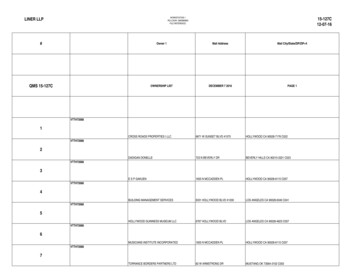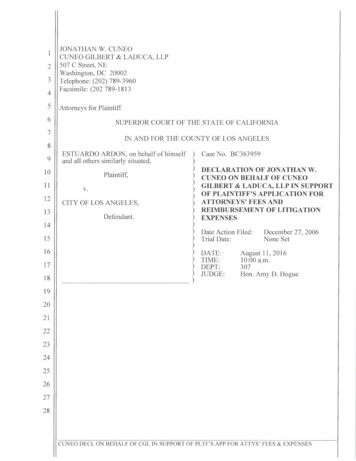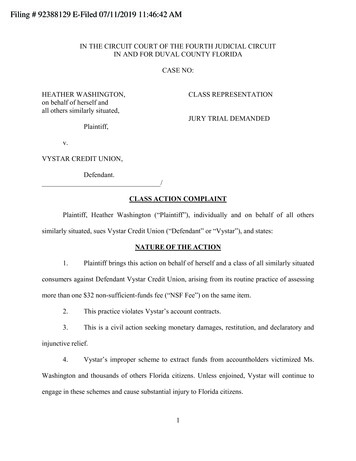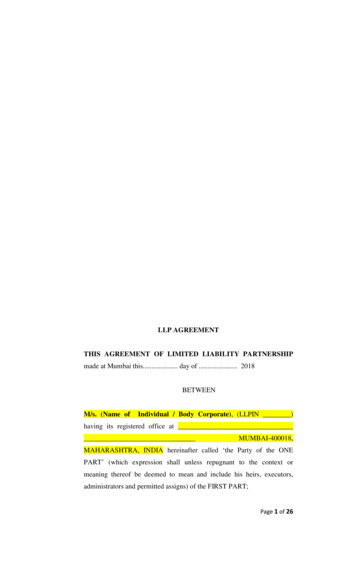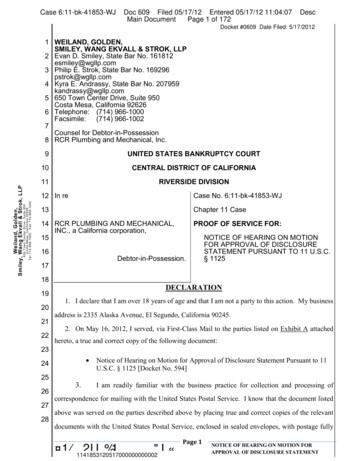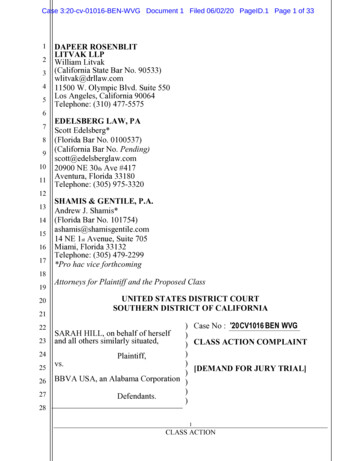
Transcription
Case 3:20-cv-01016-BEN-WVG Document 1 Filed 06/02/20 PageID.1 Page 1 of APEER ROSENBLITLITVAK LLPWilliam Litvak(California State Bar No. 90533)wlitvak@drllaw.com11500 W. Olympic Blvd. Suite 550Los Angeles, California 90064Telephone: (310) 477-5575EDELSBERG LAW, PAScott Edelsberg*(Florida Bar No. 0100537)(California Bar No. Pending)scott@edelsberglaw.com20900 NE 30th Ave #417Aventura, Florida 33180Telephone: (305) 975-3320SHAMIS & GENTILE, P.A.Andrew J. Shamis*(Florida Bar No. 101754)ashamis@shamisgentile.com14 NE 1st Avenue, Suite 705Miami, Florida 33132Telephone: (305) 479-2299*Pro hac vice forthcomingAttorneys for Plaintiff and the Proposed ClassUNITED STATES DISTRICT COURTSOUTHERN DISTRICT OF CALIFORNIA) Case No : '20CV1016 BEN WVGSARAH HILL, on behalf of herself)and all others similarly situated,) CLASS ACTION COMPLAINT)Plaintiff,)vs.) [DEMAND FOR JURY TRIAL]BBVA USA, an Alabama Corporation ))Defendants.)1CLASS ACTION
Case 3:20-cv-01016-BEN-WVG Document 1 Filed 06/02/20 PageID.2 Page 2 of 33CLASS ACTION COMPLAINT12345Plaintiff Sarah Hill on behalf of herself and all persons similarly situated,allege the following based on personal knowledge as to allegations regarding thePlaintiff and on information and belief as to other allegations.67INTRODUCTION1.Plaintiff brings this action on behalf of themselves, the general public,89and classes of all similarly situated consumers against Defendant BBVA USA10(“BBVA” or “Bank”), arising from their routine practices of (a) assessing OD Fees11121314on transactions that did not actually overdraw the account; and (b) charging morethan one non-sufficient funds fee (“NSF Fee”) on a single item.2.BBVA misleadingly and deceptively misrepresents the above1516practices in its publicly available marketing materials, including its own account17contracts. BBVA also omits material facts pertaining to each of the above practices18192021in its publicly available marketing materials, including its account contracts.3.BBVA’s customers have been injured by BBVA’s improper practicesto the tune of millions of dollars bilked from their accounts in violation of their222324252627agreements with BBVA.4.In addition, the deception, aimed at general public, continues to thisday. BBVA’s account contracts (including the Consumer Account DepositAgreement and the Fee Schedule) and marketing materials (including the282CLASS ACTION
Case 3:20-cv-01016-BEN-WVG Document 1 Filed 06/02/20 PageID.3 Page 3 of 33123Overdraft Disclosure) and are publicly available online and in BBVA branches toall current and prospective accountholders. The general public relies on4representations in these documents in making important financial decisions5regarding with whom they would like to open a checking account. Consumers who6789101112have already opened accounts also rely on the misrepresentations and omissions inthe publicly available account documents when making every day financialtransactions.5.The Pew Charitable Trusts has emphasized the importance oftransparent checking account fee disclosures for both comparison shopping for13141516171819202122checking accounts and for effective fee avoidance:Bank accounts are an essential financial product, used by 9 in 10American households, and need to be safe and transparent. Accountagreements and fee schedules provide customers with account costs,terms, and conditions. Among the largest U.S. banks, however, themedian length of checking account disclosure documents is 40 pages,and the information is presented in varied formats with inconsistentwording, making it difficult for consumers to easily find theinformation they need to comparison shop, avoid overdraft and otherfees, and manage their money.The Pew Trusts, “The Benefits of Uniform Checking Account Disclosures.”2324252627286.Members of the public considering opening a checking account havethe right to accurate information regarding the checking accounts they areconsidering. Research shows that fees are the most important factor influencingconsumers’ selection of a new banking provider. See Ron Shevlin, “How3CLASS ACTION
Case 3:20-cv-01016-BEN-WVG Document 1 Filed 06/02/20 PageID.4 Page 4 of 33123Consumers Choose a Bank: A Tale of Two Surveys.” Insight Vault, k-a-tale-of-two-surveys/ (summarizing two consumer5surveys that revealed that the most important factor influencing consumers’678910selection of a new banking provider is the amount of fees charged); Claire Greeneand Joanna Stavins, The 2016 and 2017 Surveys of Consumer Payment Choice:Summary Results. FederalReserveBankofBoston, 10 nsumer-payment-choice-summary-results.aspx (finding that 4 in 10131415consumers who did not have a bank account cited expense as the reason, including“fees and service charges are too high.”).167.17Reasonable consumers would not agree to open BBVA checking18accounts if they were informed, for example, that they could incur overdraft fees19on transactions that did not overdraw their account; could incur two or three202122insufficient funds fees on a single attempted electronic payment; or could incurthree or four discrete ATM fees for a single out-of-network ATM use.238.24On behalf of themselves, the general public, and the Classes, Plaintiff25seek damages, restitution, and public injunctive relief for Defendant’ breach of26contract and violations of California’s consumer protection laws.2728//4CLASS ACTION
Case 3:20-cv-01016-BEN-WVG Document 1 Filed 06/02/20 PageID.5 Page 5 of 331PARTIES29.34Sarah Hill is a resident of San Diego, California and holds a BBVAchecking account.510.Defendant BBVA USA is engaged in the business of providing retail678910banking services to consumers, including Hill and members of the putativeClasses, which includes the issuance of debit cards for use by its customers inconjunction with their checking accounts. BBVA USA operates banking centers,11and thus conducts business, throughout the State of California and the United12States.13JURISDICTION AND VENUE1411.1516171819BBVA USA regularly and systematically provides retail bankingservices throughout the State of California, including in this county, and providesretail banking services to its customers, including members of the putative Class.As such, it is subject to the personal jurisdiction of this Court.2012.This Court has original jurisdiction of this action under the Class2122Action Fairness Act of 2005. Pursuant to 28 U.S.C. §§ 1332(d)(2) and (6), this23Court has original jurisdiction because the aggregate claims of the putative class2425members exceed 5 million, exclusive of interest and costs, and at least one of the26members of the proposed classes is a citizen of a different state than BBVA.27//285CLASS ACTION
Case 3:20-cv-01016-BEN-WVG Document 1 Filed 06/02/20 PageID.6 Page 6 of 33123413.Venue is proper in this district pursuant to 28 U.S.C. § 1391 becauseBBVA is subject to personal jurisdiction here and regularly conducts business inthis District, and because Plaintiff was assessed fees in this district5FACTUAL BACKGROUND AND GENERAL ALLEGATIONS67I.8A. Overview of Claim914.101112131617181920Plaintiff bring this cause of action challenging BBVA’s practice ofcharging overdraft fees on what are referred to in this complaint as “AuthorizePositive, Purportedly Settle Negative Transactions,” or “APPSN Transactions.”15.1415BBVA CHARGES OD FEES ON TRANSACTIONS THAT DO NOTACTUALLY OVERDRAW THE ACCOUNTHere is how it works. At the moment debit card transactions areauthorized on an account with positive funds to cover the transaction, BBVAimmediately reduces consumers’ checking accounts for the amount of thepurchase, sets aside funds in a checking account to cover that transaction, and as aresult, the consumer’s displayed “available balance” reflects that subtracted21amount. As a result, customers’ accounts will always have sufficient available22funds available to cover these transactions because BBVA has already sequestered2324these funds for payment.16.25262728However, BBVA still assesses crippling 32 OD Fee on many ofthese transactions and mispresents its practices in its account documents.//6CLASS ACTION
Case 3:20-cv-01016-BEN-WVG Document 1 Filed 06/02/20 PageID.7 Page 7 of 3312317.Despite putting aside sufficient available funds for debit cardtransactions at the time those transactions are authorized, BBVA later assesses OD4Fees on those same transactions when they purportedly settle days later into a5negative balance. These types of transactions are APPSN transactions.67891018.BBVA maintains a running account balance in real time, trackingfunds consumers have for immediate use. This running account balance is adjusted,in real-time, to account for debit card transactions at the precise instance they are11made. When a customer makes a purchase with a debit card, BBVA sequesters the12funds needed to pay the transaction, subtracting the dollar amount of the13141516171819transaction from the customer’s available balance. Such funds are not available forany other use by the accountholder, and such funds are specifically associated witha given debit card transaction.19.Indeed, the entire purpose of the immediate debit and hold of positivefunds is to ensure that there are enough funds in the account to pay the transaction202122232425262728when it settles, as discussed in the Federal Register notice announcing revisions tocertain provisions of the Truth in Lending Act regulations:When a consumer uses a debit card to make a purchase, a hold may beplaced on funds in the consumer’s account to ensure that theconsumer has sufficient funds in the account when the transaction ispresented for settlement. This is commonly referred to as a “debithold.” During the time the debit hold remains in place, which may beup to three days after authorization, those funds may be unavailablefor the consumer’s use for other transactions.7CLASS ACTION
Case 3:20-cv-01016-BEN-WVG Document 1 Filed 06/02/20 PageID.8 Page 8 of 331234Federal Reserve Board, Office of Thrift Supervision, and National Credit UnionAdministration, Unfair or Deceptive Acts or Practices, 74 FR 5498-01 (Jan. 29,2009).520.That means when any subsequent, intervening transactions are67891011initiated on a checking account, they are compared against an account balance thathas already been reduced to account for any earlier debit card transactions. Thismeans that many subsequent transactions incur OD Fees due to the unavailabilityof the funds sequestered for those debit card transactions.1221.Still, despite keeping those held funds off-limits for other transactions,131415BBVA improperly charges OD Fees on those APPSN Transactions, although theAPPSN transactions always have sufficient available funds to be “covered.”1622.17Indeed, the Consumer Financial Protection Bureau (“CFPB”) has18expressed concern with this very issue, flatly calling the practice “deceptive”19when:202122232425262728A financial institution authorized an electronic transaction, whichreduced a customer’s available balance but did not result in anoverdraft at the time of authorization; settlement of a subsequentunrelated transaction that further lowered the customer’s availablebalance and pushed the account into overdraft status; and when theoriginal electronic transaction was later presented for settlement,because of the intervening transaction and overdraft fee, the electronictransaction also posted as an overdraft and an additional overdraft feewas charged. Because such fees caused harm to consumers, one ormore supervised entities were found to have acted unfairly when theycharged fees in the manner described above. Consumers likely had no8CLASS ACTION
Case 3:20-cv-01016-BEN-WVG Document 1 Filed 06/02/20 PageID.9 Page 9 of 331234567891011121314151617reason to anticipate this practice, which was not appropriatelydisclosed. They therefore could not reasonably avoid incurring theoverdraft fees charged. Consistent with the deception findingssummarized above, examiners found that the failure to properlydisclose the practice of charging overdraft fees in these circumstanceswas deceptive. At one or more institutions, examiners found deceptivepractices relating to the disclosure of overdraft processing logic forelectronic transactions. Examiners noted that these disclosures createda misimpression that the institutions would not charge an overdraft feewith respect to an electronic transaction if the authorization of thetransaction did not push the customer’s available balance intooverdraft status. But the institutions assessed overdraft fees forelectronic transactions in a manner inconsistent with the overall netimpression created by the disclosures. Examiners therefore concludedthat the disclosures were misleading or likely to mislead, and becausesuch misimpressions could be material to a reasonable consumer’sdecision-making and actions, examiners found the practice to bedeceptive. Furthermore, because consumers were substantially injuredor likely to be so injured by overdraft fees assessed contrary to theoverall net impression created by the disclosures (in a manner notoutweighed by countervailing benefits to consumers or competition),and because consumers could not reasonably avoid the fees (given themisimpressions created by the disclosures), the practice of assessingfees under these circumstances was found to be unfair.1819Consumer Financial Protection Bureau, Winter 2015 “Supervisory20Highlights.”212223242523.There is no justification for these practices, other than to maximizeBBVA’s overdraft fee revenue. APPSN Transactions only exist becauseintervening checking account transactions supposedly reduce an account balance.26But BBVA is free to protect its interests and either reject those intervening27transactions or charge OD Fees on those intervening transactions—and it does the289CLASS ACTION
Case 3:20-cv-01016-BEN-WVG Document 1 Filed 06/02/20 PageID.10 Page 10 of 3312345latter to the tune of millions of dollars each year. But BBVA was not content withthese millions in OD Fees. Instead, it sought millions more in OD Fees on theseAPPSN Transactions.24.Besides being deceptive, unfair, and unconscionable, these practices6789101112breach contract promises made in BBVA’s adhesion contracts—contracts whichfundamentally misconstrue and mislead consumers about the true nature ofBBVA’s processes and practices. These practices also exploit contractualdiscretion to gouge consumers.25.In plain, clear, and simple language, the checking account contract1314151617documents covering overdraft fees promise that BBVA will only charge overdraftfees on transactions that have insufficient funds to “cover” that transaction.26.In short, BBVA is not authorized by contract to charge OD Fees on18transactions that have not overdrawn an account, but it has done so and continues19to do so.202122232425B. Mechanics of a Debit Card Transaction27.A debit card transaction occurs in two parts. First, authorization forthe purchase amount is instantaneously obtained by the merchant from BBVA.When a merchant physically or virtually “swipes” a customer’s debit card, the26credit card terminal connects, via an intermediary, to BBVA, which verifies that27the customer’s account is valid and that sufficient available funds exist to “cover”2810CLASS ACTION
Case 3:20-cv-01016-BEN-WVG Document 1 Filed 06/02/20 PageID.11 Page 11 of 33123the transaction amount.28.At this step, if the transaction is approved, BBVA immediately4decrements the funds in a consumer’s account and sequesters funds in the amount5of the transaction, but does not yet transfer the funds to the merchant.67891011121314151617181920212229.Indeed, the entire purpose of the immediate debit and hold of positivefunds is to ensure that there are enough funds in the account to pay the transactionwhen it settles, as discussed in the Federal Register notice announcing revisions tocertain provisions of the Truth in Lending Act regulations:When a consumer uses a debit card to make a purchase, a hold may beplaced on funds in the consumer’s account to ensure that theconsumer has sufficient funds in the account when the transaction ispresented for settlement. This is commonly referred to as a “debithold.” During the time the debit hold remains in place, which may beup to three days after authorization, those funds may be unavailablefor the consumer’s use for other transactions.Federal Reserve Board, Office of Thrift Supervision, and National Credit UnionAdministration, Unfair or Deceptive Acts or Practices, 74 FR 5498-01 (Jan. 29,2009).30.Sometime thereafter, the funds are actually transferred from the2324customer’s account to the merchant’s account. This is referred to in the banking25industry as “posting” or “settling”—something which may occur several days after262728the transaction was initially initiated.31.There is no change—no impact whatsoever—to the available funds in11CLASS ACTION
Case 3:20-cv-01016-BEN-WVG Document 1 Filed 06/02/20 PageID.12 Page 12 of 33123an account when posting or payment of a transaction that settles in the sameamount for which it authorized occurs. That is because available funds amounts do4not change for debit card transactions that settle in the same amount for which they5were authorized.67891011C. BBVA’s Account Contract32.Plaintiff has a BBVA checking account, which is governed byBBVA’s standardized Consumer Account Agreement.33.The standardized Consumer Account Agreement is a publicly12available document available online and in BBVA branches to all current and13prospective accountholders. Consumers, and the general public, rely on account1415agreements like BBVA’s in making important financial decisions regarding to16whom they would like to entrust their money. In addition, BBVA accountholders17181920rely on the Consumer Deposit Account Agreement in making every day financialtransactions and predicting which transactions will incur fees and for how much.34.The Consumer Deposit Account Agreement and relevant contract2122documents covering overdraft fees provide that BBVA will only charge OD Fees23on transactions with insufficient funds to cover a given transaction:2425262728Available Balance. The balance of funds in your account that is available forimmediate withdrawal. Unlike the posted balance, the available balancereflects any holds placed on your account, including the restrictionsdescribed in the Funds Availability Disclosure included with thisAgreement. Your available balance may be more or less than the amount ofyour posted balance, but does not include any credit available under any12CLASS ACTION
Case 3:20-cv-01016-BEN-WVG Document 1 Filed 06/02/20 PageID.13 Page 13 of 33123456789101112131415161718192021222324BBVA USA Overdraft Protection Line of Credit you may have.[ ]If an item was initiated at a point-of-sale terminal or is a VISA transaction orATM transaction, you agree that we may charge the amount of the item toyour account or place a hold on your account in the amount requested by themerchant immediately upon authorization of such transaction, even thoughwe have not then actually received the item for payment. We will makepayment for a transaction only after the actual transaction is presented to usphysically or electronically. Each such hold will reduce the available balancein your account by the amount of the hold.[ ]Insufficient Available Balance and Overdrafts. If your availablebalance is insufficient to pay the total amount of items presentedagainst your account, we may, at our option, return any of the itemsunpaid or pay any or all of the items, even though payment will causean overdraft of your account. We may return any item at any time ifyour available balance is insufficient to pay t
checking account. 10. Defendant BBVA USA is engaged in the business of providing retail banking services to consumers, including Hill and members of the putative Classes, which includes the issuance of debit cards for use by its customers in conjunction with their checking accounts. BBVA
